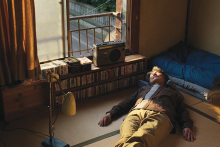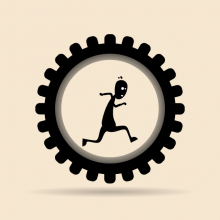quiet

ONE WAY TO take a culture’s temperature at a given moment is to look at the art it produces. This is particularly true in film — a visual medium and a business largely driven by audiences’ perceived interests. Movies reflect their times, not just visually, but thematically.
Films made during the Great Depression, for example, included social realist dramas like Leo McCarey’s Make Way for Tomorrow, about an elderly couple who lose their home to foreclosure, and works of optimistic patriotism like Frank Capra’s Mr. Smith Goes to Washington, where Jimmy Stewart brings his determined charm to Capitol Hill. Others, like Capra’s romantic comedy It Happened One Night, offered troubled moviegoers good-natured escapism.
So, what’s on our minds recently, cinematically speaking? Among other things, a pandemic, corrupt institutions, international tragedies, and (another) contentious election year. There are many reasons viewers might want to escape into simpler or more fantastical worlds.
One recent trend, however, has surprised me: movies about presence.

In July 2010 I joined with around 100 freedom fighters in Chicago, many of whom had traded the previous year of their lives to fight for comprehensive immigration reform. And we knew it was not going to happen in 2010, at least as we had imagined. Many in the room were exhausted, and defeated, and spent. The response from the campaign was to talk about the next hill to climb rather than deal with the pain and exhaustion in the room.
Doing justice is hard and exhausting work. We are compelled to action by the urgency of the suffering and pain and evil that mark life for so many in God’s world. And the work is never done. Win or lose, there is always another hill, another peak, another challenge that lies ahead. So the temptation is to keep on keeping on, and to rise to the next challenge.
For the past 20 years, I have either been a pastor or a community organizer, and for many of those years I have been both. For pastors and organizers, there is always one more email to write, one more call to make, and one more strategy to be explored. To be blunt, burnout and exhaustion are the order of the day.
AS MY EXTENDED family gathered around the Thanksgiving dinner table before the latest market crash, conversation with cousins flowed about friends making big money with technology start-ups: “more, more; faster, faster; bigger, bigger; louder, louder.”
A hail of laughter greeted me when I quietly muttered that my ambition was, “poorer, poorer; slower, slower; smaller, smaller; quieter, quieter.”
When Sojourners started in 1971, I was 23 years old. Seven young seminary students pooled $100 each and used an old typesetter that we rented for $25 a night above a noisy bar to print 20,000 copies of the first Post-American, the predecessor to Sojourners magazine. We took the bundles in our trucks and cars to student unions in college campuses across the country and began collecting subscriptions in a shoebox kept in one of our rooms.
For more than a decade, we shared our money in common, trying to live as the early Christians (see Acts 2), and allowed ourselves $5 a month for personal spending. The highest-paid staff person was a young woman from a neighborhood family who wanted an evening cleaning job.
We worshiped together twice a week and opened our homes to our neighbors. When our first child was born, Jackie and I brought him home to a row house in Columbia Heights in D.C. where we were living with 18 other people, including an African-American family and a Lakota couple with some of their extended family from the reservation in South Dakota. You had to be a bit crazy to be in the early community. And yes, we were poor. And we were small.